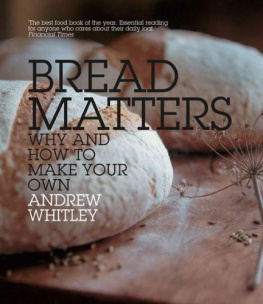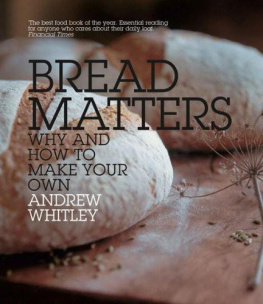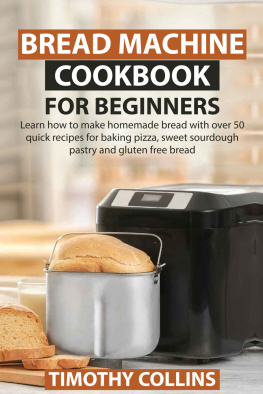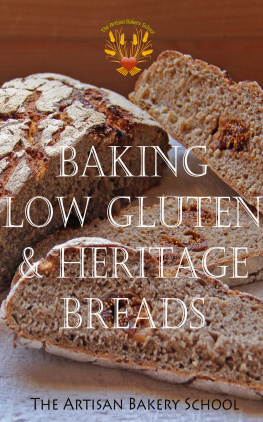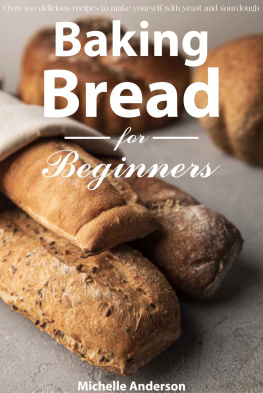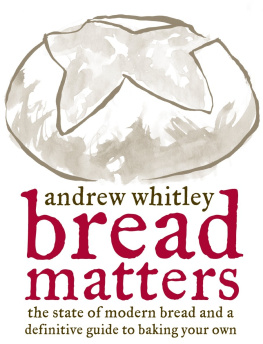Andrew Whitley - Bread Matters: The Sorry State of Modern Bread and a Definitive Guide to Baking Your Own
Here you can read online Andrew Whitley - Bread Matters: The Sorry State of Modern Bread and a Definitive Guide to Baking Your Own full text of the book (entire story) in english for free. Download pdf and epub, get meaning, cover and reviews about this ebook. year: 2010, publisher: Fourth Estate, genre: Romance novel. Description of the work, (preface) as well as reviews are available. Best literature library LitArk.com created for fans of good reading and offers a wide selection of genres:
Romance novel
Science fiction
Adventure
Detective
Science
History
Home and family
Prose
Art
Politics
Computer
Non-fiction
Religion
Business
Children
Humor
Choose a favorite category and find really read worthwhile books. Enjoy immersion in the world of imagination, feel the emotions of the characters or learn something new for yourself, make an fascinating discovery.
- Book:Bread Matters: The Sorry State of Modern Bread and a Definitive Guide to Baking Your Own
- Author:
- Publisher:Fourth Estate
- Genre:
- Year:2010
- Rating:5 / 5
- Favourites:Add to favourites
- Your mark:
Bread Matters: The Sorry State of Modern Bread and a Definitive Guide to Baking Your Own: summary, description and annotation
We offer to read an annotation, description, summary or preface (depends on what the author of the book "Bread Matters: The Sorry State of Modern Bread and a Definitive Guide to Baking Your Own" wrote himself). If you haven't found the necessary information about the book — write in the comments, we will try to find it.
Andrew Whitley, organic baker and founder of The Village Bakery, reveals the deplorable state into which modern supermarket bread has fallen, and the secrets behind making good, nutritious bread at home.
All is not well in British baking. Commercial bread is laced with additives to make it look good and stay soft. It uses varieties of wheat that have been bred for high yield and baking performance with little concern for human nutrition. To rush it through the bakery at the lowest possible cost, its dosed with four times as much yeast as before. Described as fresh when it may have been frozen and re-heated, its sold as a loss-leader at knock-down prices which undermine what little respect it may once have commanded.
Even before the Atkins diet frightened people off, there was evidence of a massive growth of intolerance to gluten, wheat and yeast in particular. Call it coincidence. Dismiss it as hypochondria if you will. But things have come to a pretty pass when people avoid their staple food the staff of life in droves.
Bread Matters offers a solution. Revealing the madness behind this modern adulteration of our most basic food as only an insider can, organic baker Andrew Whitley, founder of The Village Bakery in Melmerby, shows why and how to make real bread at home. Unlike many bread book authors, he has baked for a living for over 25 years. His recipes are fool-proof because he explains whats really going on, demystifying the science, sharing a practical bakers craft. Using the skills he deploys on his popular courses, he guides and inspires beginners and seasoned bakers alike. And he brings good news to those who have had to abandon bread because of dietary sensitivity, showing how to bake tasty and nutritious food without yeast, wheat or gluten.
ReviewWhat an important book; passionate and polemical and full of truth. The chapter too on gluten-free baking is original and inspiring.Bee Wilson, Sunday Telegraph and New StatesmanThis will be the most important book on baking since the publication of Elizabeth Davids English Bread and Yeast Cookery. Rose PrinceMakes for interesting reading, and Whitley makes the information accessible by using easy-to-follow tables where appropriateThroughout the book Whitley has dotted interesting historical footnotes to recipes and practical tips to recover from baking disasters. The book is comprehensive in its span of recipes and its examination of the baking process. Caterer and HotelkeeperA superb and necessary new book. Bee Wilson, The Sunday TelegraphEvery bit as feisty as the title impliesa good sense book that includes recipes for sour-dough and gluten-free baking. The IndependentThe best food book of the year. Part counterblast against the shocking state of British baking, part manifesto for us all to get our hands floury and do something about it. Essential reading for anyone who cares about their daily loaf. Financial Times Pick of the YearCommitted to the cause of getting us to eat properly, Bread Matters explains clearly whats wrong with commercial bread and how to bake your own. Independent
ReviewWhat an important book; passionate and polemical and full of truth. The chapter too on gluten-free baking is original and inspiring.Bee Wilson, Sunday Telegraph and New Statesman This will be the most important book on baking since the publication of Elizabeth Davids English Bread and Yeast Cookery. Rose Prince Makes for interesting reading, and Whitley makes the information accessible by using easy-to-follow tables where appropriate!Throughout the book Whitley has dotted interesting historical footnotes to recipes and practical tips to recover from baking disasters. The book is comprehensive in its span of recipes and its examination of the baking process. Caterer and Hotelkeeper A superb and necessary new book. Bee Wilson, The Sunday Telegraph Every bit as feisty as the title implies!a good sense book that includes recipes for sour-dough and gluten-free baking. The Independent The best food book of the year. Part counterblast against the shocking state of British baking, part manifesto for us all to get our hands floury and do something about it. Essential reading for anyone who cares about their daily loaf. Financial Times Pick of the Year Committed to the cause of getting us to eat properly, Bread Matters explains clearly whats wrong with commercial bread and how to bake your own. Independent
Andrew Whitley: author's other books
Who wrote Bread Matters: The Sorry State of Modern Bread and a Definitive Guide to Baking Your Own? Find out the surname, the name of the author of the book and a list of all author's works by series.

